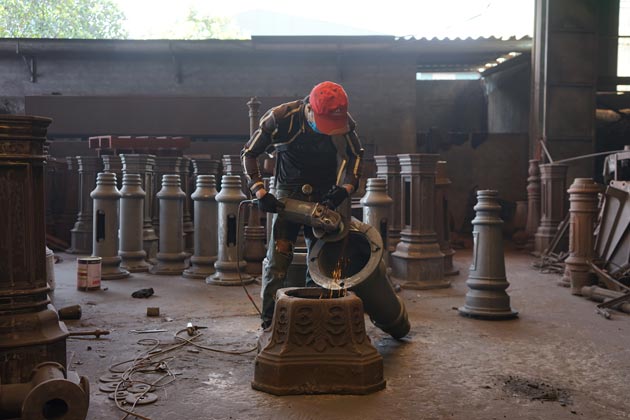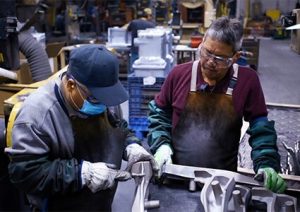Understanding the Benefits and Innovations in the Aluminum Foundry Sector
The Aluminum Foundry market plays a necessary duty in modern production. Its light-weight residential properties significantly improve fuel effectiveness, especially in aerospace and auto industries. On top of that, Aluminum's resistance to corrosion warranties durability in various applications. As the market develops, developments such as innovative recycling and additive manufacturing are improving manufacturing approaches. Checking out these developments reveals not just the benefits but additionally the difficulties in advance for Aluminum factories in a swiftly changing market.
The Lightweight Benefit of Aluminum
Aluminum's lightweight nature uses considerable benefits across numerous industries, specifically in manufacturing and transport. Its low thickness allows for the manufacturing of parts that are much easier to deal with and mount, causing decreased labor prices and boosted effectiveness. In the automotive industry, lighter lorries contribute to enhanced gas economy and lower discharges, straightening with global sustainability goals. In aerospace, the use of Aluminum decreases the total weight of airplane, which is crucial for improving efficiency and lowering functional costs.
Furthermore, Aluminum's lightweight homes promote ingenious layouts that were formerly impossible with larger products. This adaptability makes it possible for manufacturers to create complex shapes and structures while maintaining architectural honesty. On the whole, the light-weight benefit of Aluminum not only enhances item efficiency but likewise drives innovations in innovation and style, making it a recommended product in different applications.
Deterioration Resistance and Longevity
The Aluminum Foundry sector is renowned for generating products with exceptional deterioration resistance, making them optimal for different applications. This home, incorporated with improved structural honesty, adds to the resilient performance benefits that Aluminum components offer. Therefore, markets progressively rely upon Aluminum to meet demanding ecological conditions without compromising top quality.
Superior Rust Resistance
While various steels deal with significant obstacles from environmental variables, Aluminum stands out for its exceptional deterioration resistance, making it a favored choice in several applications. This property is largely due to an all-natural oxide layer that bases on the Aluminum surface area, providing an obstacle against dampness and corrosive representatives. Unlike other steels that might rust or weaken in time, Aluminum keeps its honesty also in harsh settings, such as commercial setups or seaside locations. Additionally, its lightweight nature integrated with deterioration resistance makes it suitable for applications in aerospace, automotive, and marine sectors. In general, Aluminum's phenomenal longevity not just enhances product durability yet additionally reduces maintenance expenses, providing an engaging advantage for customers and suppliers alike.
Enhanced Structural Integrity
Designers and engineers progressively acknowledge the significance of boosted architectural integrity in modern applications, where both deterioration resistance and sturdiness are essential. Aluminum alloys, understood for their light-weight buildings, additionally exhibit phenomenal resistance to corrosion, making them ideal for rough settings. The ingenious methods employed in the Aluminum Foundry sector add significantly to creating components with improved resilience. Advanced casting processes and alloy compositions are tailored to meet specific efficiency demands, making certain that structures can hold up against severe conditions without endangering honesty. Surface area treatments and layers improve the lifespan of Aluminum products, better reducing damage over time. This focus on boosted structural stability not just extends the use of materials however also minimizes upkeep costs, strengthening Aluminum's placement as a material of option in various sectors.
Lasting Efficiency Benefits
Lasting performance in Aluminum parts is largely associated to their premium corrosion resistance and durability. Unlike lots of steels, Aluminum naturally forms a protective oxide layer, which avoids corrosion and wear and tear in various environments, including commercial and aquatic setups. This integral building substantially extends the lifespan of Aluminum products, minimizing maintenance and replacement prices. Furthermore, the light-weight nature of Aluminum boosts its applicability throughout industries without compromising strength. The material's resistance to wear and tear also adds to its dependability popular applications, making it an ideal choice for automobile, aerospace, and building markets. As markets increasingly prioritize sustainability and longevity, Aluminum's efficiency advantages line up with contemporary engineering needs, solidifying its duty in ingenious manufacturing processes.
Ecological Influence and Sustainability
 As the Aluminum Foundry industry progresses, it increasingly prioritizes ecological influence and sustainability, acknowledging the demand for responsible practices when faced with environment adjustment. Initiatives to minimize waste and energy usage go to the center, with many foundries embracing recycling efforts to recover Aluminum scrap. This not only minimizes basic material use yet additionally especially lowers energy expense, as recycled Aluminum needs click resources just a portion of the power compared to primary production.
As the Aluminum Foundry industry progresses, it increasingly prioritizes ecological influence and sustainability, acknowledging the demand for responsible practices when faced with environment adjustment. Initiatives to minimize waste and energy usage go to the center, with many foundries embracing recycling efforts to recover Aluminum scrap. This not only minimizes basic material use yet additionally especially lowers energy expense, as recycled Aluminum needs click resources just a portion of the power compared to primary production.Moreover, improvements in emissions manage innovations are being applied to reduce air toxins, lining up procedures with stricter ecological laws. Shops are likewise discovering alternate energy resources, such as solar and wind, to power their facilities sustainably. By fostering cooperation with stakeholders, the market aims to create ingenious solutions that improve environmental stewardship. Collectively, these campaigns highlight a dedication to decreasing the Aluminum Foundry's carbon impact while promoting a round economic situation within the manufacturing field.
Advanced Manufacturing Techniques
 Revolutionizing production processes, the Aluminum Foundry sector is increasingly integrating advanced production strategies to boost performance and accuracy. Strategies such as computer system mathematical control (CNC) machining and additive manufacturing have become important elements in optimizing production operations. CNC machining permits for high-precision part construction, significantly decreasing material waste and production time. Meanwhile, additive production opens new avenues for complicated geometries and lightweight designs that were formerly tough to attain.
Revolutionizing production processes, the Aluminum Foundry sector is increasingly integrating advanced production strategies to boost performance and accuracy. Strategies such as computer system mathematical control (CNC) machining and additive manufacturing have become important elements in optimizing production operations. CNC machining permits for high-precision part construction, significantly decreasing material waste and production time. Meanwhile, additive production opens new avenues for complicated geometries and lightweight designs that were formerly tough to attain.Furthermore, the implementation of automation and robotics in Aluminum foundries simplifies procedures, minimizes human mistake, and enhances employee security. These technologies promote a more responsive manufacturing environment, making it possible for producers to adjust swiftly to market needs. The combination of advanced simulation software program even more boosts the design and screening phases, causing exceptional item quality. Jointly, these techniques not just improve functional performance but additionally foster advancement, placing the Aluminum Foundry industry at the leading edge of modern-day manufacturing.
Technologies in Recycling Processes
The Aluminum Foundry sector is not just advancing in producing methods however is additionally making considerable strides in recycling procedures. Innovations are arising to enhance the efficiency of reusing approaches, lowering power intake and enhancing sustainability. Advanced sorting innovations, such as automatic optical sorting, enable the identification and splitting up of Aluminum from various other products with high precision. This leads to a better of recycled Aluminum, which is crucial for keeping the stability of the end products.
In addition, closed-loop recycling systems are being applied, enabling manufacturers to recycle Aluminum scrap within their very own production procedures. This reduces waste and promotes a round economic climate. Additionally, study into new recycling techniques, such as hydrometallurgical procedures, uses the potential for recouping Aluminum from complicated waste streams. These innovations not just add to minimizing the carbon footprint of the Aluminum Foundry sector but additionally reinforce its financial viability in an increasingly eco mindful market.
Applications Throughout Various Industries
Many sectors are progressively identifying the versatility and benefits of Aluminum Foundry items, leading to extensive applications throughout fields such as automobile, aerospace, consumer, and building goods. In the automobile market, Aluminum spreadings add to light-weight vehicle designs, improving gas performance and efficiency. Aerospace producers use Aluminum elements for their strength-to-weight proportion, crucial for airplane structures and components.
In building, Aluminum is favored for its longevity and resistance to corrosion, making it optimal for window frameworks, roofing, and structural supports. Consumer items additionally take advantage of Aluminum Foundry items, as seen in cookware, electronic devices, and product packaging, where lightweight and recyclable materials are crucial.
The flexibility of Aluminum Foundry strategies enables detailed styles and exact specs, dealing with the varied requirements of these industries. Because of this, Aluminum Foundry items are this post ending up being important to contemporary manufacturing procedures across various sectors.
Future Fads in Aluminum Foundries
As markets remain to advance, Aluminum shops are poised to welcome a number of essential fads that guarantee to enhance performance and sustainability. One famous trend is the raising fostering of digital modern technologies, including automation and expert system, which enhance operations and boost high quality control. Additionally, the press in the direction of lasting methods is leading foundries to read what he said spend in reusing modern technologies, greatly decreasing waste and power usage.
 Another emerging trend is the usage of innovative alloys and products, providing to the growing demand for light-weight and sturdy elements across various industries (Aluminum Foundry). The assimilation of additive production methods is expected to change component layout, supplying modification and lowering lead times.
Another emerging trend is the usage of innovative alloys and products, providing to the growing demand for light-weight and sturdy elements across various industries (Aluminum Foundry). The assimilation of additive production methods is expected to change component layout, supplying modification and lowering lead times.Collaboration with research institutions is also expected to drive technology, as foundries look for to develop brand-new procedures and products. Aluminum Foundry. Jointly, these patterns show a transformative future for the Aluminum Foundry market, aligning with more comprehensive goals of sustainability and efficiency
Regularly Asked Questions
What Are the Regular Expenses Connected With Aluminum Foundry Production?
The typical expenses connected with Aluminum Foundry manufacturing include resources, labor, energy, devices upkeep, and overhead expenses. These variables collectively influence the total financial investment needed for reliable Aluminum casting operations.
How Does Aluminum Compare to Other Metals in Toughness?
Aluminum, while lighter than numerous steels, exhibits impressive strength-to-weight ratios. Compared to steel, Aluminum is much less solid but uses excellent rust resistance, making it a favorable option in applications where weight and resilience are crucial.
What Precaution Remain In Area in Aluminum Foundries?
Safety procedures in Aluminum shops typically include necessary individual safety tools, air flow systems to regulate fumes, regular equipment maintenance, training programs for employees, and adherence to strict security policies to lessen dangers related to liquified metal handling.
Exactly How Is Quality Assurance Managed in Aluminum Spreading Processes?
Quality assurance in Aluminum casting processes includes rigorous assessments at numerous phases, consisting of raw product analysis, procedure tracking, and end product testing. Strategies such as analytical procedure control and non-destructive testing guarantee adherence to industry standards.
What Accreditations Are Essential for Aluminum Foundry Vendors?
The significance of certifications for Aluminum Foundry suppliers consists of ISO 9001 for high quality administration, ISO 14001 for environmental monitoring, and industry-specific requirements like ASTM and SAE, guaranteeing conformity, safety and security, and dependability in making procedures.
The Aluminum Foundry sector plays a crucial function in contemporary production. The Aluminum Foundry market is renowned for producing products with remarkable corrosion resistance, making them ideal for numerous applications. Reinventing production procedures, the Aluminum Foundry market is increasingly integrating advanced production techniques to improve efficiency and precision. The Aluminum Foundry sector is not only progressing in manufacturing methods but is likewise making significant strides in recycling procedures. As markets proceed to evolve, Aluminum factories are poised to accept several crucial fads that guarantee to boost efficiency and sustainability.